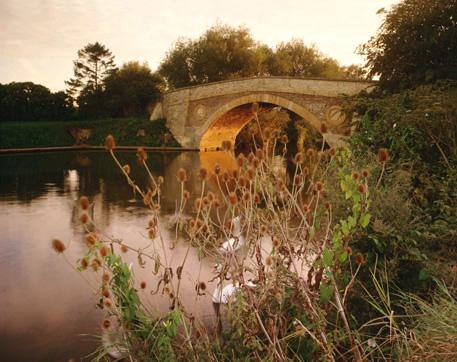
Photograph copyright ©1999 - 2018 Denis Waugh.
External Links
TADPOLE BRIDGE AND RUSHEY WEIR
William Morris and I disagree on few points, but one of them is the railway. Despite his conviction that trains were a harbinger of disaster, the fact that much of the upper Thames is not approachable by rail means that occasionally I have to swallow my principles and hire a car. I think he might have changed his mind given today's choices.
My local friendly car hire company doesn't have a cycle rack, but they do, as it happens, have a folding bike available which has never yet been used. It won't get punctures, either, because the tyres are foam-filled. Trustingly, I take it; but once off the surfaced track, this so-called `mountain' bike shows its true worth. About a hundred gears and none of them the right one. Walking would be faster and easier. The solid tyres render the steering incredibly difficult and before I have crossed one field I am longing for my sturdy Hercules. Take it from me, there is nothing to compare with a solid bike with three-speed Sturmey Archer gears.
Tadpole Bridge was built in tandem with the Thames and Severn Canal, when the water depth had to be increased to the 3 feet, 6 inches required by the barges. Not a lot, but enough to render the existing Tadpole Ford unuseable.
You forget, don't you, the human pace of life? Approaching Tadpole I see a young couple with a dog and two piebald horses. One of the horses is pulling a cart, with the young woman aboard. The man walks beside the other horse which pulls a caravan: round, the shape and style of a prairie wagon. They make a timelessly handsome couple. She with her old green sweater and short dark hair, he with long golden hair, dreadlocked, and dungarees. The girl smiles but then the traffic light on the bridge changes to green and suddenly the man cries `Gyp! Get up boy!' and the dog races ahead, up and over the hump of the bridge, the horses break from their leisurely amble into a clattering canter, up and over. And they have gone. I gaze after them, dazed. This is how Toad felt before he decided to go for the motor car. And then I retreat into the Trout Inn to take stock.
Late October and it is still warm enough to eat outside, where rosehips twine through late creamy blooms and snowy pampas grass waves gently against a sky the blue of Australian opal. The landlord looks genuinely pleased to see me, which is the first sign of a good pub, and there is a fine selection of real ales, which is the second.
Rushey Weir is an old fashioned sort of weir, with a huge number of great wooden paddles standing by ready to regulate the flow as required. The water sprays out in a great fan and then falls in lacy patterns like Cinderella's ballgown. The lock keeper is having trouble with his chainsaw and I pass by discreetly with what I judge to be just the right amount of sympathy. It has never been my habit to mess with a fellow having trouble with a chainsaw.
The rushes seen in abundance in this part of the Thames have had a multitude of uses for many generations, including the weaving of mats, chair seats and baskets and the making of fine paper. And wouldn't it be wonderful to find a country pub that still spread its floors with rushes? They used to be strewn in great halls and in churches, over earthen or stone flagging, and must have been warm and fragrant, mixed with meadowsweet and sweet-flag. A bit like herbal teabags, perhaps. Having seen service as a floor covering, they could be chopped up for garden mulch.
Rush lights were vastly preferred by William Cobbett to candles. Rush lighting is apparently brilliant and clean, especially with the addition of beeswax. It was for many years the basic source of illumination in the country cottages hereabouts. The lights were made by stripping the outside skin of the stem until just one long rib was left to keep the pith together. Then, having being left outside to dry for some days, they were dipped in scalding mutton or bacon grease. I'm not entirely sure about the smell of mutton or bacon grease, but Cobbett's word is good enough for me.
Text copyright ©1999 - 2018 Priscilla Waugh.